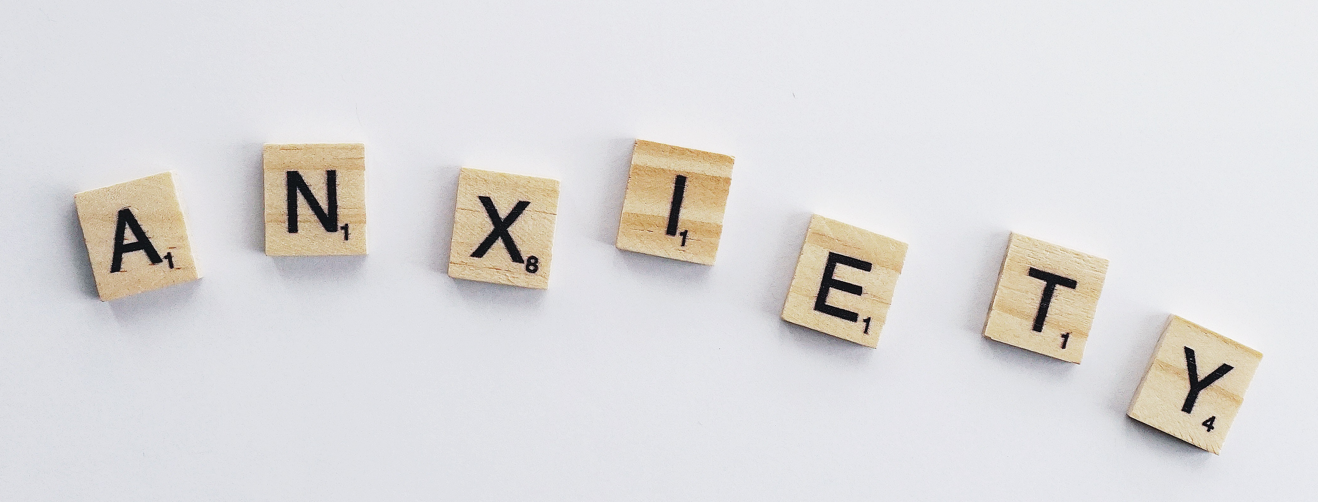Anxiety is the body’s response to stress. It’s an innate way of telling us to take a high-stakes situation seriously. It often includes feelings of fear, nervousness, and unease.
Having normal levels of anxiety is a healthy part of life — we all experience it from time to time. But, when anxiety comes along with physical signs like rapid breathing, quickened heart rate, or panic attacks, it can negatively impact one’s life. Some people find it impossible to control their anxiety and negative thoughts.
Luckily, many strategies can help control anxiety and prevent it from becoming too overwhelming. Breathing exercises prepare the body for the rapid breathing that anxiety causes. Mindfulness and meditation strengthen the mind and help it to control negative thoughts.

While there is no single best natural treatment for anxiety, there are several ways to manage and treat this condition, including behavioural practices and herbal remedies. If you’re looking for an effective home remedy for anxiety, you’ve come to the right place.
Best Natural Remedies for Anxiety
Meditation and Mindfulness
Meditation is the practice of controlling one’s thoughts so that one can see the world more clearly. It helps people gain more awareness and focus. Because it makes the brain less reactive to outside stressors, meditation for anxiety is an excellent practice to add to your routine. Its benefits reach far beyond stress management; meditation improves attention span, sleep, and patience.
There are many meditation types:
- Breathwork
- Scanning the body
- Using your 5 senses
- Sound meditation
- Movement meditation (walking meditation)
- Mantra meditation
- Visualisation
- Mindfulness meditation
- Labelling
- Loving-kindness meditation
- Adult colouring books
Cognitive Behavioural Therapy (CBT)
Cognitive behavioural therapy (CBT) is a type of therapy that works on correcting negative thought patterns. CBT for anxiety helps one to notice when their thoughts begin to spiral downhill and redirect these towards a more positive course. CBT is one of the most used natural remedies for anxiety and depression because it provides lifelong coping techniques.
Dialectic Behavioural Therapy (DBT)
Dialectic behavioural therapy (DBT) is a type of talking therapy for people who feel emotions very intensely. DBT for anxiety strengthens one’s ability to self-regulate emotions and thoughts, allowing one to self-soothe in anxiety-inducing situations. DBT is a natural treatment for anxiety that helps manage worry, fear, and other symptoms of anxiety.
Natural Herbs
Research suggests that the use of certain herbs may help reduce symptoms of anxiety. Herbs such as ashwagandha, chamomile, and lavender may alleviate anxiety. Many people use natural herbs for anxiety to avoid the negative side effects of anti-anxiety drugs, like drowsiness, fatigue, diminished libido, and nausea.
Kava is a traditional drink from the Pacific Islands that’s gaining popularity worldwide. Drinking kava can significantly decrease anxiety in the moment, as it evokes calm and relaxed feelings.
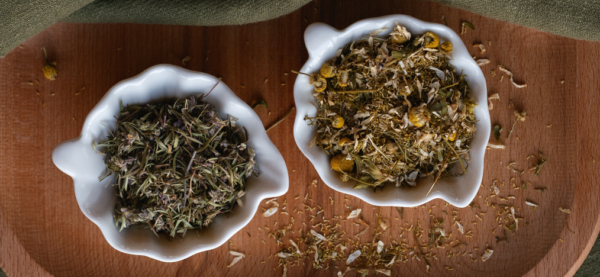
Herbal Tea for Anxiety
Humans have used herbal teas as a natural anxiety medicine for centuries. Tea is a convenient, delicious, and completely natural way to feel calm.
Here are the top 10 herbal teas with calming effects:
- Chamomile
- Peppermint
- Valerian Root
- Passionflower
- Ashwagandha
- St. John’s Wort
- Lemon Balm
- Green Tea
- Lavender
- Licorice
Aromatherapy
Aromatherapy has been used for centuries in the form of incense and essential oils to promote overall well-being. It is also one of the most soothing natural remedies for anxiety.
One of the most loved scents is lavender. It is a beautiful scent with calming capabilities and is proven to have significant anxiolytic (anxiety-reducing) effects. Lavender also aids the parasympathetic nervous system to regulate the systems that control anxiety’s physical symptoms, like heart rate and hormone secretion.
How to Effectively Use Aromatherapy
To use aromatherapy as a natural anxiety relief method, add 3 to 15 drops of essential oils, depending on the oils you’re using, per cup of water in a water-based oil diffuser. Diffuse for 30 to 60 minutes. You can also use reed diffusers that come with safely measured essential oil ingredients.
Breathing Exercises
Breathwork dates back to ancient traditions and religions as a tool to improve overall well-being. Deep breathing exercises were used for their natural healing properties and, in some cases, the ability to alter consciousness.
Breathwork re-gained popularity in the 1960s, along with spiritual psychology and physiological research. Many techniques have emerged, including deep breathing for anxiety. Deep breathing is the most popular breathing exercise and is one of the most effective relaxation techniques for anxiety.
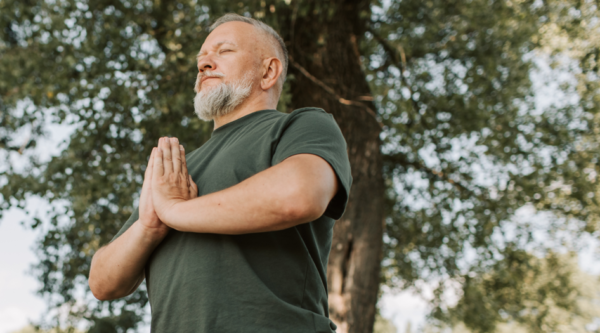
How to Find the Right Breathing Exercise for You
Breathing exercises are some of the most effective natural remedies for anxiety. You can try some of the most popular breathing practices to see which one/s work best for you:
- Diaphragmatic breathing
- Focused breathing
- Long exhales
- Resonant breathing
- Lion’s breath
- 4-7-8
- Alternating nostrils
Acts of Self-Love
Self-love is being added to many lists of natural remedies for anxiety because being compassionate towards oneself hugely impacts how we manage stress. By taking the time to do things for yourself every once in a while, you can improve your outlook and attitude.
Practicing self-love is about accepting your strengths, weaknesses, flaws, and unique personality at face value. It doesn’t mean you stop improving; it’s about “loving what you cannot change and improving what you can.”
Self-Love vs. Selfish Behaviour
In practicing self-love in addition to other natural remedies for anxiety, be mindful of the fact that self-love is not the same as selfishness. Self-love is loving yourself so you can love others, too, because you can’t pour from an empty cup. Selfishness, on the contrary has no regard for others.
Explore Nature
Research has proven time and time again that walking in nature improves mood and reduces anxiety and depression. Just as we evolved with nature, our bodies seem to prefer it and thrive in it! In fact, a study found that photos of nature in doctor’s offices gave patients more positive experiences.
Proximity to nature is correlated with lower stress levels and better mental health. Take advantage of nature’s gifts as a natural remedy for anxiety by spending just a few minutes outside each day.
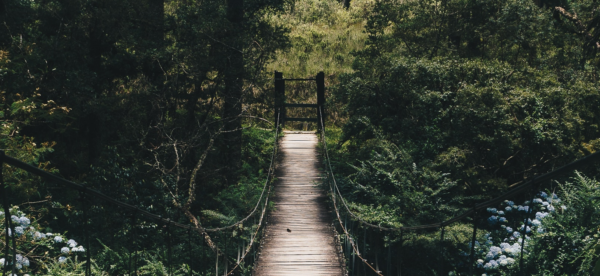
Water vs. Green Scenery
We all know that spending time near natural, green scenery is a mood booster. But not many are aware that man-made water fixtures like fountains and ponds also have therapeutic effects! This is good news for people in landlocked areas or cities, as these structures offer natural anxiety relief, as well.
Detox from Alcohol and Cigarettes
Aside from asking yourself what it is you can do or use to alleviate anxiety, another question you should ask is how to reduce anxiety naturally. Especially if you regularly consume alcohol and tobacco products. These products may seem to help you relax, but they both cause heightened anxiety in the long run (or even one day after).
Nicotine addiction is associated with constant anxiety and irritability. Tobacco users are also twice as likely as non-users to develop depression.
How to Effectively Detox from Alcohol and Cigarettes
Detoxing from alcohol and/or cigarettes is extremely difficult. Not only is it a mental challenge, but the body goes through a painful withdrawal process before it can function without the substance.
Quitting requires strength, but the physical and mental benefits are well worth the struggle. There many resources and groups for people starting the journey towards a healthier life.
Eat Healthy
We all know the saying, “You are what you eat.” Well, it’s true – there’s a link between eating healthy and feeling good mentally!
For example, complex carbohydrates (whole grains) are metabolised slowly, maintaining stable blood sugar levels and preventing mood swings (like anxiety). Foods with antioxidants like fruits, beans, and vegetables also may reduce anxiety.
Of course, all of our daily habits affect mental health, so we should all do our best to have good ones.
How to Get Rid of Anxiety with Food
Adding certain foods to your diet can do wonders for your mental health, specifically with anxiety. Here are some of them:
- Berries: Berries are high in antioxidants.
- Quinoa: Quinoa is a complex carb that digests slowly and maintains stable blood sugar levels.
- Oysters: Oysters contain zinc, which helps the body cope with stress.
- Yogurt: Yogurt, like all probiotics, promotes gut health which plays a role in serotonin production.
Assess Your Sleeping Habits
The relationship between sleep and anxiety is so strong that throwing it off can result in a vicious cycle of anxiety and sleeplessness. Lack of sleep causes irritability and a weakened mental state – precursors to anxiety. Conversely, anxiety makes it hard to fall asleep at night. Natural sleep remedies can prevent this cycle from starting.
Getting a good night’s sleep is tremendously important in keeping anxiety at bay. Natural remedies for sleep anxiety include avoiding caffeine before bed and yoga.
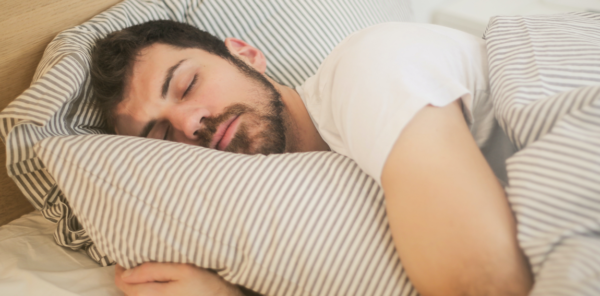
How to Fall Asleep on Demand
Sleeping is easy, but falling asleep can be much harder. Luckily, you can take steps to help you fall asleep faster.
Avoid devices for 30 minutes before bed and opt for a book to help the brain recognise when it’s time for sleep.
Melatonin supplements also help, but note that they’re habit-forming if used regularly.
Exercise Regularly
Regular exercise is great for your body, and it’s also one of the natural remedies for anxiety. When we exercise, anti-anxiety neurochemicals like serotonin are released. This makes us feel more energised and positive.
It’s also beneficial to exercise outdoors as this also distracts the mind from ideas stirring up anxiety. For those with social anxiety or physical insecurities, exercise is a great way to socialise and get fit in group settings with limited one-on-one pressure.
Creating a Schedule That Works for You
If working out every day doesn’t fit your schedule, that’s fine! Choosing realistic goals that you’re more likely to stick to sets a healthier precedent.
Mindfully walking outside is an effective meditation for anxiety. Bring a friend along if that will make it more enjoyable, even if it’s for just 10 minutes a day or only a few days a week.
Why Natural Remedies Work
Natural remedies for anxiety work because they address the root of the problem rather than merely treating the symptoms. One can’t learn to control anxiety without developing healthy habits and taking actions to strengthen their mental health. Chemical medication is a great way to cover up anxiety but it only avoids the source of the issue.
Managing anxiety through natural ways teaches us how to control stress and fear. It helps us recognise the difference between healthy anxiety and irrational anxiety. Because natural remedies don’t disturb the brain’s chemical makeup, they don’t cause any harmful side effects, unlike anxiety medicines.
The Danger of Medicating for Anxiety
While acknowledging that medication may be necessary for severe anxiety disorders, it’s important to consider other strategies before resorting to medication.
Medications mask symptoms rather than treating the cause, so the patient never learns how to manage their own anxiety and stays reliant on the drug. They also have a number of side effects like:
- Drowsiness
- Dependence and withdrawal symptoms
- Sexual dysfunction
- Suicidal thoughts
- Elevated blood pressure
- Increased heart rate
- Abnormal heartbeat
- Weight gain

Anti-anxiety drugs, such as Xanax and Klonopin, are frequently abused and used recreationally. For these reasons, we recommend trying a home remedy for anxiety before seeking medication.
What Does Anxiety Feel Like?
Anxiety can manifest mentally, physically, or both. The prevalence of anxiety has increased over the years — 1 in 7 Australians are now experiencing an anxiety disorder. With this rise in cases, it’s important to know the natural remedies for anxiety, so you can practice them or share them with those around you.
If you notice feeling any or all of these symptoms, you might be having an anxiety attack:
- Heavy breathing
- Upset stomach
- Fast or irregular heartbeat
- Sweating
- Racing thoughts
- Teeth grinding
- Difficulty sleeping
- Muscle tension
- Irritability
- Constant worrying
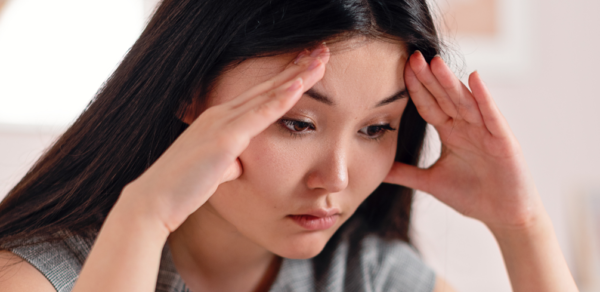
What Are Signs of Anxiety?
Remember, anxiety is natural. It helps us face dangerous or intense situations. It is only considered a disorder when it becomes so overwhelming that it negatively affects one’s daily life.
Signs of an anxiety disorder include:
- Frequent worrying
- Frequent panic attacks
- Inability to sleep
- Feeling anxious for no apparent reason or multiple times per day
- Feeling too anxious to go to work, school, or social events
CBT and DBT can have life-changing results for people with anxiety disorders. Trying them along with other natural strategies is usually extremely effective!
Nervousness
Though nervousness can occur on its own, it can sometimes be a symptom of an anxiety disorder. We often get nervous about upcoming events like interviews, parties, or presentations. This is normal! However, feeling nervous, tense, and restless for no apparent reason might be related to anxiety.
How to Find Relief
There are many natural ways to reduce anxiety and nervousness. If you’re feeling nervous, try doing breathwork like focused breathing. Focusing on your breathing patterns and how they feel or sound has a calming effect.

Sense of Panic or Danger
Overwhelming feelings of danger and fear while you’re in a safe situation can be a sign of an anxiety attack or disorder. Anxiety is meant to prepare you for intense situations; it’s not normal for your body to feel in danger when it’s not.
How to Find Relief
Panic attacks are overwhelming, scary, and hard to manage, so you’ve got to have some self-soothing strategies on deck. In these moments, breathing techniques are useful for staying in control and level-headed. Resonant breathing keeps anxiety attacks at bay by avoiding deep breaths; deep breaths can cause hyperventilation. Social anxiety natural remedies, like exercising regularly and avoiding alcohol, can also prevent these feelings.
Increased Heart Rate
Increased heart rate or heart palpitations are some of the common physical symptoms of anxiety. This is because anxiety triggers our sympathetic nervous system’s fight or flight response. The body is essentially preparing itself to deal with a dangerous situation.
This inappropriate stress response increases heart rate, raising blood pressure and putting unwanted stress on the cardiovascular system.
How to Find Relief
Chronic anxiety negatively affects the heart, so finding natural ways to reduce anxiety is a must. Taking part in DBT prepares you for stressful situations and teaches you how to remain calm during these tense moments. For example, if you tell your therapist that social settings make your heart rate increase, they can teach you how to control your thoughts and emotions in those settings.
Hyperventilation
Hyperventilation literally means “over-breathing” or “excessive breathing.” While hyperventilating, you may feel like you can’t catch your breath and there’s tightness in your chest. You might feel like you’re suffocating or struggling for air.
Anxiety triggers the fight or flight response and makes us breathe faster, but breathing too fast or too deeply can actually throw off oxygen and carbon dioxide levels. Consequently, hyperventilation is often accompanied by dizziness, numbness, and muscle spasms.
How to Find Relief
Breathing techniques are the key to preventing and stopping hyperventilation. During an episode, some helpful techniques are holding each breath in for 10 seconds, breathing into a paper bag or cupped hand, and diaphragmatic breathing.
Diaphragmatic breathing works as a natural anxiety medicine by promoting relaxation, slowing the heart rate, and slowing down breathing.

Increased Sweating
Have you ever heard of “the nervous sweats”? As anxiety sets off the fight or flight response, we sweat in preparation for physical activity. Excessive sweating is one of the physical symptoms of anxiety that plagues many people.
Stress sweat even uses different glands than regular sweat that are located in the groin, armpits, and chest. Stress sweat also smells different from normal sweat because it contains more proteins, which bacteria thrive on.
How to Find Relief
Most modern-day anxiety doesn’t involve physical danger, so sweating is unwanted and oftentimes embarrassing. A good way to stop sweating is by distracting yourself from whatever is making you nervous. Going on a long walk in nature has serious calming effects and can return the mind to a more tranquil state.
Trembling
Trembling is another physical sign of anxiety. As your body prepares to fight or flee, your muscles become primed for action. You may experience trembling, twitching, or shaky hands. These muscle spasms can be inconvenient, especially if you’re in a public setting. However, these are not necessarily dangerous to you unless they are accompanied by more severe symptoms like hyperventilation and increased heart rate.
How to Find Relief
Trembling usually stops after the body realises that it’s not under threat. But, if this symptom persists, you can try a number of natural remedies for panic attacks and anxiety.
Exercising regularly, especially in nature, has calming effects that can prevent anxiety and its symptoms. It’s also super beneficial to the muscles and cardiovascular system, both of which anxiety affects.
Tiredness
Anxiety makes the body expend a ton of energy when it releases stress hormones. This is heavily draining and can leave one feeling mentally and physically tired after. As a result, those who frequently have anxiety attacks may experience chronic fatigue.
As mentioned above, anxiety can cause difficulty sleeping for a lot of people. This lack of sleep can make you exhausted throughout the day, and this can increase anxiety on its own.
How to Find Relief
Getting regular exercise supports mental and physical health, reduces anxiety, and makes it easier to sleep at night. Also, green tea is an excellent stress reducer and contains caffeine, providing a small energy boost!
Difficulty Concentrating
Anxiety can make it difficult to focus on one thing for extended periods. It also causes racing thoughts and intense worry – two things that make concentration tough. Many people find that anxiety causes them to focus on the wrong things rather than the task at hand.
This can make everyday life difficult, especially regarding work, school, and relationships. It’s crucial to find which natural anxiety relief works for you so anxiety doesn’t negatively impact your life.
How to Find Relief
Meditation can put you into a deep state of relaxation. During meditation, you calm your mind and focus your attention, eliminating the stream of jumbled thoughts that may be overwhelming you.
Mindfulness meditation is an ideal form of meditation for anxiety. It allows you to focus on your breathing, and then bring your mind’s attention to the present without drifting into concerns about the past or future.

Difficulty Falling or Staying Asleep
One of the more frustrating symptoms of anxiety is having a hard time falling asleep. Racing thoughts and palpitations can indeed make it difficult to fall asleep. Another sleep issue related to anxiety is the inability to stay asleep.
Worrying at night can lead to a vicious cycle of anxiety and lack of sleep that causes more anxiety. On top of that, laying in bed with no distractions makes it difficult to distract your mind from anxiety-inducing thoughts.
How to Find Relief
Avoiding caffeine at nighttime and turning off all mobile devices at least 30 minutes before you go to bed are two ways to help you fall asleep faster.
Here are two anxiety and insomnia natural remedies that can help:
• Chamomile tea: reduces anxiety and is caffeine-free, so you can drink it before bedtime to wind down.
• Melatonin: a natural supplement that makes us fall asleep.
Stomach Aches
A “nervous stomach” is a real diagnosis that links gastrointestinal (GI) problems mental health and anxiety. Nausea, vomiting, or feeling knots in the belly are all physical symptoms of anxiety.
The gastrointestinal tract is sensitive to emotion, including anxiety. Anxiety releases hormones that affect the linings of the stomach, which is why many people get “butterflies” or have to run to the bathroom when they’re nervous. Chronic anxiety can even lead to painful stomach ulcers.
How to Find Relief
Herbal remedies are the best way to mend a nervous stomach. Studies found that peppermint oil offers natural anxiety relief by helping to relieve stomach pain like bloating and trapped gas. Ginger is another natural stomach soother that you can take in pure form, as tea, or as a candy.
Learn How to Help Someone with Anxiety
With anxiety on the rise in our society, knowledge of natural anxiety treatments is more in demand than ever. We offer courses that can equip you with all the tools to help others strengthen their mental health and control their anxiety holistically.
At CCM, we stress the importance of addressing the root of the problem, not treating symptoms endlessly. If you want to learn more about natural remedies for anxiety, connect with us, so we can help you help others.
Frequently Asked Questions
How to Calm an Anxiety Attack
Focused breathing allows you to avoid hyperventilation and slowly calm yourself down during an episode. Mindfulness is essential to stopping an anxiety attack – recognise what’s happening and divert your thoughts to calming objects. Think about one object near you and describe it in your head until you can control your other thoughts, too.
There are several natural remedies for anxiety attacks to try before resulting to medication.
What is Social Anxiety?
Social anxiety refers to a fear of social situations. Unlike regular nervousness that we all experience, social anxiety looks like avoiding social events, overanalysing your actions in public, and being unable to speak to strangers.
Social anxiety is related to self-esteem and confidence. Feeling down about yourself makes you more likely to fear harsh judgment from others, even if there is no proof. It also causes negative opinions about oneself and social isolation.
Can You Get Rid of Anxiety?
Remember that some anxiety is healthy; our bodies have evolved to help us out in stressful situations. That being said, anxiety can’t be “cured,” but there are ways to reduce it.
Things like yoga, mindful meditation, and breathwork can reduce anxiety and provide healthy coping mechanisms. Every mind and body is different, so it takes time to figure out and know how to relieve anxiety for you.
What is Anxiety?
Anxiety is characterised by unease, worry, tension, and heightened physical senses. It’s a normal emotion we all experience in the face of danger or uncertain situations.
Anxiety disorder differs in that the sufferer feels anxious in safe situations for no apparent reason. Those with anxiety disorders may experience racing thoughts, fear, increased heart rate, and difficulty breathing at inappropriate times.
Anxiety disorders can be caused by a stressful upbringing, traumatic events, brain chemistry, or drug use.
This article explains how to reduce anxiety naturally in full detail!
